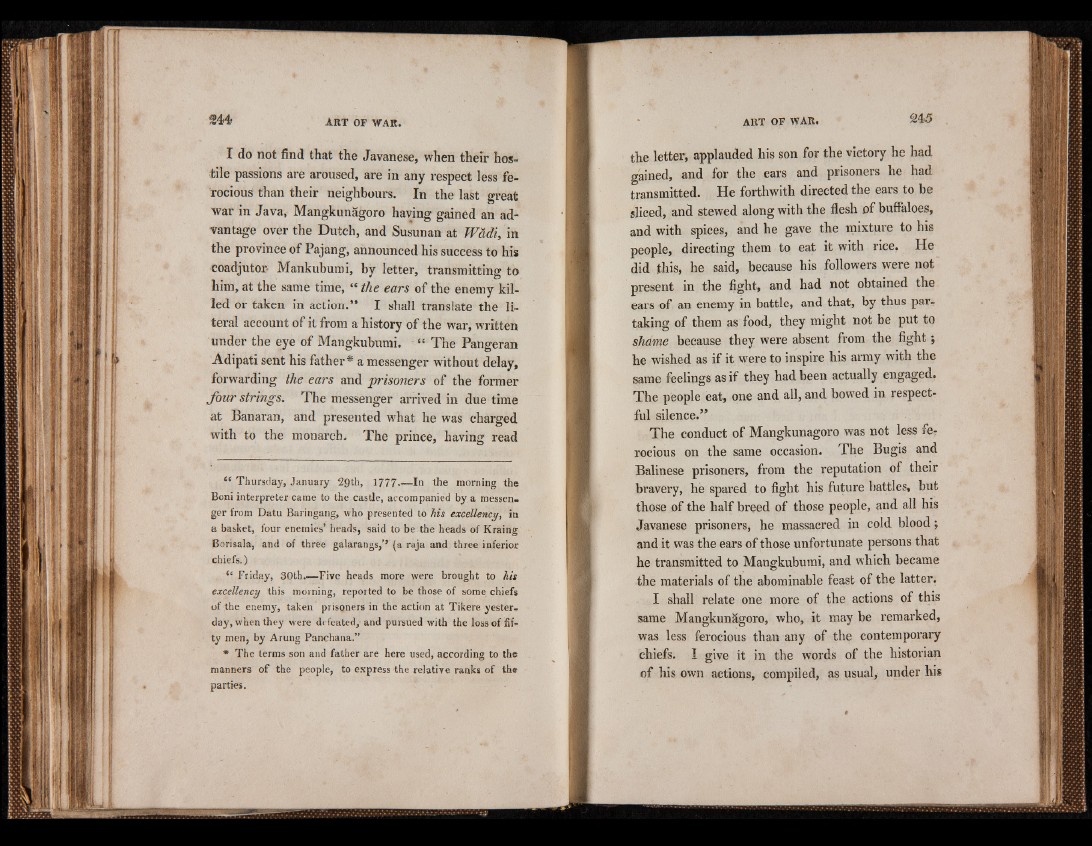
I do not find that the Javanese, when their hostile
passions are aroused, are in any respect less ferocious
than their neighbours. In the last great
war in Java, Mangkunagoro having gained an advantage
over the Dutch, and Susunan at Wadi, in
the province of Pajang, announced his success to his
coadjutor- Mankubumi, by letter, transmitting to
him, at the same time, “ the ears of the enemy killed
or taken in action.” I shall translate the literal
account of it from a history of the war, written
under the eye of Mangkubumi. “ The Pangeran
Adipati sent his father* a messenger without delay,
forwarding the ears and prisoners of the former
four strings. The messenger arrived in due time
at Banaran, and presented what he was charged
with to the monarch. The prince, having read
“ Thursday, January 29th, 1 777 In the morning the
Boni interpreter came to the castle, accompanied by a messenger
from Datu Baringang, who presented to his excellency, in
a basket, four enemies’ heads, said to be the heads of Kraing
Borisala, and of three galarangs,’’ (a raja and three inferior
chiefs.)
“ Friday, 30th.—Five heads more were brought to his
excellency this morning, reported to be those of some chiefs
of the enemy, taken prisoners in the action at Tikere yesterday,
when they were defeated,1 and pursued with the loss of fifty
men, by Arung Panchana.”
* The terms son and father are here used, according to the
manners of the people, to express the relative ranks of the
parties.
the letter, applauded his son for the victory he had
gained, and for the ears and prisoners he had
transmitted. He forthwith directed the ears to be
sliced, and stewed along with the flesh of buffaloes,
and with spices, and he gave the mixture to his
people, directing them to eat it with rice. He
did this, he said, because his followers were not
present in the fight, and had not obtained the
ears of an enemy in battle, and that, by thus partaking
of them as food, they might not be put to
shame because they were absent from the fight;
he wished as if it were to inspire his army with the
same feelings as if they had been actually engaged.
The people eat, one and all, and bowed in respectful
silence.”
The conduct of Mangkunagoro was not less ferocious
on the same occasion. The Bugis and
Balinese prisoners, from the reputation of their
bravery, he spared to fight his future battles, but
those of the half breed of those people, and all his
Javanese prisoners, he massacred in cold blood;
and it was the ears of those unfortunate persons that
he transmitted to Mangkubumi, and which became
the materials of the abominable feast of the latter.
I shall relate one more of the actions of this
same Mangkunagoro, who, it may be remarked,
was less ferocious than any of the contemporary
chiefs. I give it in the words of the historian
of his own actions, compiled, as usual, under his